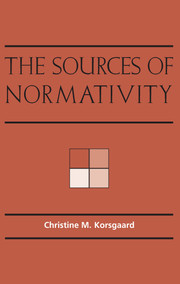Book contents
- Frontmatter
- Contents
- Notes on the contributors
- Acknowledgments
- Introduction
- Prologue: Excellence and obligation a very concise history of western metaphysics 387 bc to 1887 ad
- 1 The normative question
- 2 Reflective endorsement
- 3 The authority of reflection
- 4 The origin of value and the scope of obligation
- 5 Reason, humanity, and the moral law
- 6 Morality and identity
- 7 Universality and the reflective self
- 8 History, morality, and the test of reflection
- 9 Reply
- Bibliography
- Index
5 - Reason, humanity, and the moral law
Published online by Cambridge University Press: 20 May 2010
- Frontmatter
- Contents
- Notes on the contributors
- Acknowledgments
- Introduction
- Prologue: Excellence and obligation a very concise history of western metaphysics 387 bc to 1887 ad
- 1 The normative question
- 2 Reflective endorsement
- 3 The authority of reflection
- 4 The origin of value and the scope of obligation
- 5 Reason, humanity, and the moral law
- 6 Morality and identity
- 7 Universality and the reflective self
- 8 History, morality, and the test of reflection
- 9 Reply
- Bibliography
- Index
Summary
You might think that, if you make a law, then that law binds you, because you made it. For, if you will the law, then how can you deny that it binds you, without contradicting your own will? But you might also think the opposite. You might think that, if you are the author of the law, then it cannot bind you. For how can it have authority over you when you have authority over it? How can it bind you when you, the lawmaker, can change it, at will, whenever you like?
Now, in that pair of arguments mutually contradictory conclusions are drawn from the selfsame premiss: the premiss that you make the law. So at least one of the arguments is invalid. But, even if they are both invalid, they might still be unignorable, because they might have elements of truth in them. They might be healthy argument–embryos out of which sound arguments could develop. And, whatever else is true, each of the arguments is sufficiently persuasive that, mutually contradictory though they are, each was affirmed in Hobbes's Leviathan, in much the form in which I just stated them.
There are, by my count, four arguments in Hobbes for the conclusion that the citizen is obliged to obey the law. Three of the arguments don't matter here.
- Type
- Chapter
- Information
- The Sources of Normativity , pp. 167 - 188Publisher: Cambridge University PressPrint publication year: 1996
- 36
- Cited by



